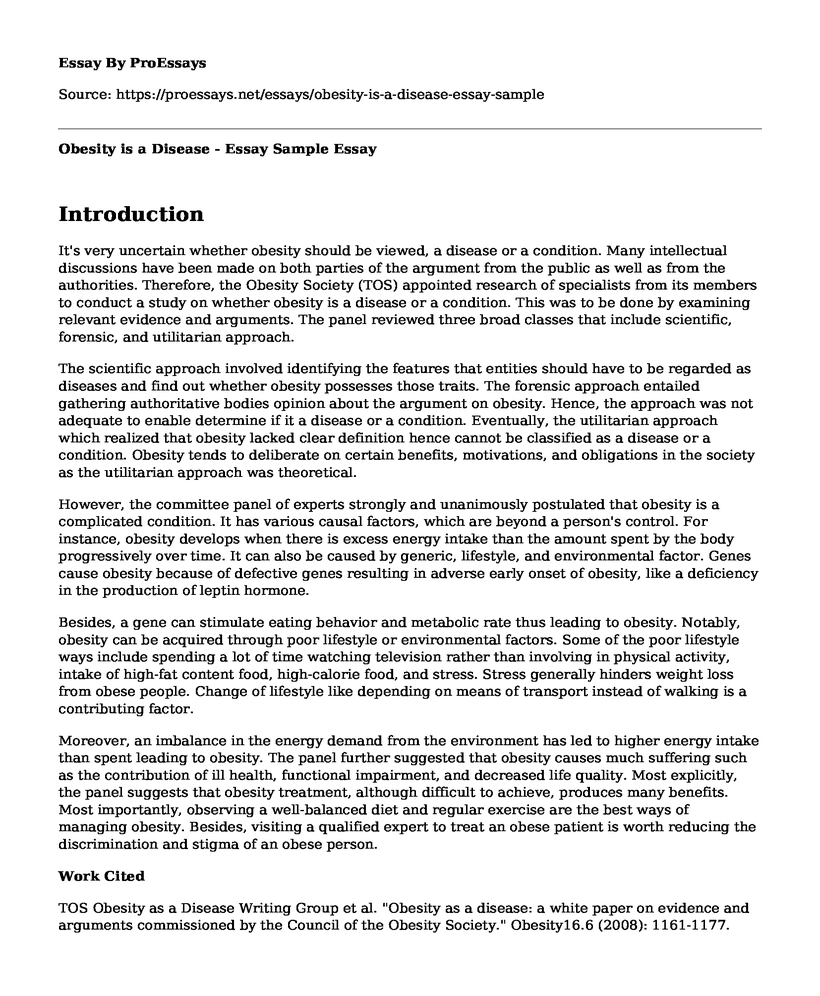Introduction
It's very uncertain whether obesity should be viewed, a disease or a condition. Many intellectual discussions have been made on both parties of the argument from the public as well as from the authorities. Therefore, the Obesity Society (TOS) appointed research of specialists from its members to conduct a study on whether obesity is a disease or a condition. This was to be done by examining relevant evidence and arguments. The panel reviewed three broad classes that include scientific, forensic, and utilitarian approach.
The scientific approach involved identifying the features that entities should have to be regarded as diseases and find out whether obesity possesses those traits. The forensic approach entailed gathering authoritative bodies opinion about the argument on obesity. Hence, the approach was not adequate to enable determine if it a disease or a condition. Eventually, the utilitarian approach which realized that obesity lacked clear definition hence cannot be classified as a disease or a condition. Obesity tends to deliberate on certain benefits, motivations, and obligations in the society as the utilitarian approach was theoretical.
However, the committee panel of experts strongly and unanimously postulated that obesity is a complicated condition. It has various causal factors, which are beyond a person's control. For instance, obesity develops when there is excess energy intake than the amount spent by the body progressively over time. It can also be caused by generic, lifestyle, and environmental factor. Genes cause obesity because of defective genes resulting in adverse early onset of obesity, like a deficiency in the production of leptin hormone.
Besides, a gene can stimulate eating behavior and metabolic rate thus leading to obesity. Notably, obesity can be acquired through poor lifestyle or environmental factors. Some of the poor lifestyle ways include spending a lot of time watching television rather than involving in physical activity, intake of high-fat content food, high-calorie food, and stress. Stress generally hinders weight loss from obese people. Change of lifestyle like depending on means of transport instead of walking is a contributing factor.
Moreover, an imbalance in the energy demand from the environment has led to higher energy intake than spent leading to obesity. The panel further suggested that obesity causes much suffering such as the contribution of ill health, functional impairment, and decreased life quality. Most explicitly, the panel suggests that obesity treatment, although difficult to achieve, produces many benefits. Most importantly, observing a well-balanced diet and regular exercise are the best ways of managing obesity. Besides, visiting a qualified expert to treat an obese patient is worth reducing the discrimination and stigma of an obese person.
Work Cited
TOS Obesity as a Disease Writing Group et al. "Obesity as a disease: a white paper on evidence and arguments commissioned by the Council of the Obesity Society." Obesity16.6 (2008): 1161-1177.
Cite this page
Obesity is a Disease - Essay Sample. (2022, Nov 22). Retrieved from https://proessays.net/essays/obesity-is-a-disease-essay-sample
If you are the original author of this essay and no longer wish to have it published on the ProEssays website, please click below to request its removal:
- Meth Epidemic
- Summary of the American Academy of Pediatrics 2010 Report
- Essay Sample on Reproductive System Disorders
- Essay Sample on Rubella/German Measles
- Asthma Diagnosis: Genetically Inherited & Worsening in Spring Weather - Essay Sample
- Essay Example: 10 Microbial Agents & How to Prevent Foodborne Illness
- Assessing Resilience in Dyslexic Individuals - Essay Sample







